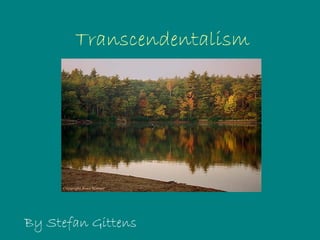
Transcendentalism
- 2. What does “transcendentalism” mean? • There is an ideal spiritual state which “transcends” the physical and empirical. • A loose collection of eclectic ideas about literature, philosophy, religion, social reform, and the general state of American culture. • Transcendentalism had different meanings for each person involved in the movement.
- 3. Where did it come from? • Ralph Waldo Emerson gave German philosopher Immanuel Kant credit for popularizing the term “transcendentalism.” • It began as a reform movement in the Unitarian church. • It is not a religion—more accurately, it is a philosophy or form of spirituality. • It centered around Boston and Concord, MA. in the mid-1800’s. • Emerson first expressed his philosophy of transcendentalism in his essay Nature.
- 4. What did Transcendentalists believe? The intuitive faculty, instead of the rational or sensical, became the means for a conscious union of the individual psyche (known in Sanskrit as Atman) with the world psyche also known as the Oversoul, life-force, prime mover and G-d (known in Sanskrit as Brahma).
- 5. Basic Premise #1 An individual is the spiritual center of the universe, and in an individual can be found the clue to nature, history and, ultimately, the cosmos itself. It is not a rejection of the existence of G-d, but a preference to explain an individual and the world in terms of an individual.
- 6. Basic Premise #2 The structure of the universe literally duplicates the structure of the individual self—all knowledge, therefore, begins with self- knowledge. This is similar to Aristotle's dictum "know thyself."
- 7. Basic Premise #3 Transcendentalists accepted the concept of nature as a living mystery, full of signs; nature is symbolic.
- 8. Basic Premise #4 The belief that individual virtue and happiness depend upon self-realization —this depends upon the reconciliation of two universal psychological tendencies: 1. The desire to embrace the whole world— to know and become one with the world. 2. The desire to withdraw, remain unique and separate—an egotistical existence.
- 9. Who were the Transcendentalists? • Ralph Waldo Emerson • Henry David Thoreau • Amos Bronson Alcott • Margaret Fuller • Ellery Channing
- 10. Ralph Waldo Emerson • 1803-1882 • Unitarian minister • Poet and essayist • Founded the Transcendental Club • Popular lecturer • Banned from Harvard for 40 years following his Divinity School address • Supporter of abolitionism
- 11. Henry David Thoreau • 1817-1862 • Schoolteacher, essayist, poet • Most famous for Walden and Civil Disobedience • Influenced environmental movement • Supporter of abolitionism
- 12. Amos Bronson Alcott • 1799-1888 • Teacher and writer • Founder of Temple School and Fruitlands • Introduced art, music, P.E., nature study, and field trips; banished corporal punishment • Father of novelist Louisa May Alcott
- 13. Margaret Fuller • 1810-1850 • Journalist, critic, women’s rights activist • First editor of The Dial, a transcendental journal • First female journalist to work on a major newspaper—The New York Tribune • Taught at Alcott’s Temple School
- 14. Ellery Channing • 1818-1901 • Poet and especially close friend of Thoreau • Published the first biography of Thoreau in 1873—Thoreau, The Poet-Naturalist
Editor's Notes
- Transcendentalism By Stefan Gittens
